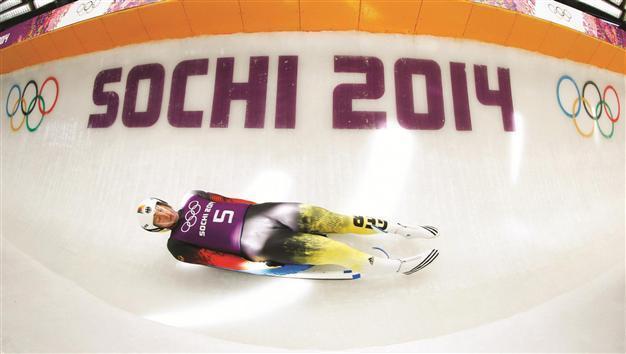German lugers set for medal bonanza
ROSA KHUTOR, Russia - Reuters

Germany’s David Moeller speeds down the track during luge training. REUTERS Photo
Long established as the dominant luge nation, Germany starts favorite to take a clean sweep of Olympic gold in singles, doubles and team relay with former great Georg Hackl confident of another medal bonanza.
“The start is not extremely steep and not optimum flat, which would be in our favor,” said Hackl, who won three Olympic golds and two silvers before moving into a coaching role. “But we are pretty sure that our athletes will perform the best start times, which will be the cornerstone for being medal contenders.”
Defending men’s champion Felix Loch has shown in six training runs down the 17 curves at the Sanki Sliding Center that he will be hard to dislodge from the top of the podium when he begins his bid Feb. 8. Loch, at 20, became the youngest ever Olympic gold medalist in luge four years ago, is the current world champion and has won back-to-back World Cup titles.
“It is important to have two good runs tomorrow and two good times on Sunday - I hope it will be a good race for me,” he said.
Teammate David Moeller, the silver medalist in Vancouver, is a threat again along with Italian Armin Zoeggeler, seeking to end his illustrious career with another medal in his sixth Olympics - only Hackl has been more successful.
Zoeggeler, the gold medalist from 2002 and 2006 and who also won silver in 1998 and bronze in 1994 and 2010, is more than capable of medaling at the age of 40.
Host nation hopesHost nation hopes lie with veteran Albert Demchenko, who, along with Japanese ski jumper Noriaki Kasai, will be competing in a record seventh Games.
The 42-year-old was a silver medalist in Turin in 2006 and showed he could be a gold medal contender with the fastest time on the final training run on Friday.
The Sanki track features three uphill sections and Canadian Samuel Edney, who finished seventh in the World Cup, predicted medals would be won and lost at the start.
“It is a feature (the uphill sections) that will ensure that the best sled wins, because if you have any sort of mistake or you are not up there with the fastest starters in the world then you don’t carry the velocity through those uphill sections,” he said.
“And that is really what is key, in that you have to be clean before those uphill sections and your lines need to be really good.”
German celebrations should also extend to the women’s singles, which start Feb. 10, having won 10 of the 12 medals since the 1998 Nagano Games.
Natalie Geisenberger, who took bronze four years ago, has enjoyed a dominant season and team mate Tatjana Huefner is under pressure to defend her Olympic title.
In the doubles on Feb. 12, Austrian brothers Andreas Linger and Wolfgang Linger seek a third successive Winter Games triumph but face stiff competition from German world champions Tobias Wendl and Tobias Arlt.
The luge competition ends with the team relay on Feb. 13, the first to be held at a Winter Games. The event features one woman, one man and one doubles team from each nation sliding back-to-back-to-back runs.
